How to republish
Read the original article and consult terms of republication.
How does remote working impact our mobility?
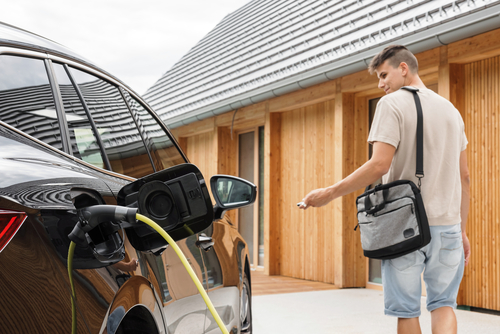
Credit : Epictura 674405464
Remote working, long seen as a distant aspiration, is now an indeniable reality, fast-tracked by the Covid-19 pandemic and lockdown measures. Ever since, debates have raged around the implications of this shift, particularly concerning spatial dynamics, and daily mobility practice. While some see it as an opportunity for more sustainable mobility in terms of traffic and pollution (more people working remotely means fewer commuters), others, such as ADEME, highlighted the rebound effects, of the end of the first lockdown, specifically with a rise in trips for private purposes, and car use, urban sprawl of populations and activities, and increased distances between work and home.
We looked at this question using data from our online survey performed in spring 2022 in metropolitan France as part of the Lability project.
Great satisfaction from working remotely
In 2022, one quarter of French employees regularly worked remotely under a legally formalised framework, versus only 3 % in 2019. Initially, remote work was primarily an occasional practice for executives, found in specific sectors. Today, not only has it extended to other categories of professionals(intermediary professionals or employees), but it also occurs more regularly and for more days, most commonly, two per week.
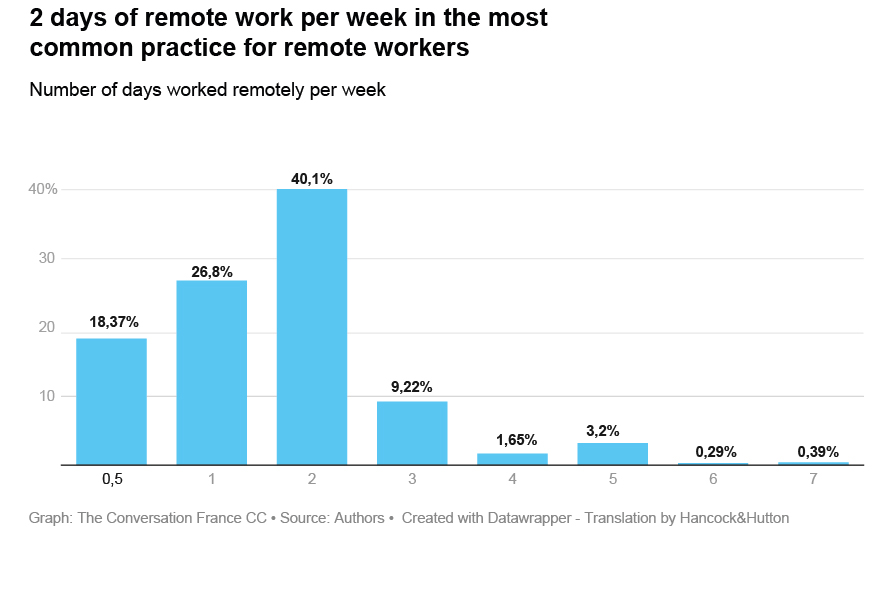
Like many studies, our results show that the majority of remote workers gain great satisfaction from working remotely, and state that they intend to continue or even increase their rate of remote work, particularly among those who work remotely one or two days per week. The point of satisfaction deemed ideal is 2.5 days per week on average. Concerning the days of remote work, though few studies have been undertaken around this, our data reveals the most common and ideal days for remote work are Fridays, followed by Mondays and Wednesdays.
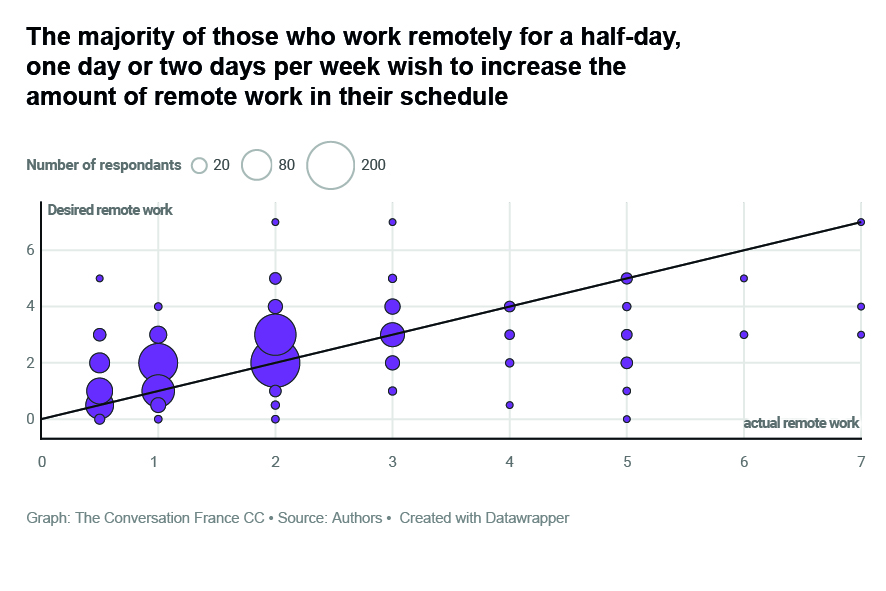
In Île-de-France, a significant decrease in public transport use has also been observed on Fridays and Mondays. There are therefore now “rush days” as well as “rush hours”.
More trips close to home
Our recent research differs from other studies in that it compares the practices of remote workers before and after starting to work remotely, with three key results.
Firstly, remote work has led to non-professional trips being recentred near the home. 55% of remote workers surveyed state that they do not leave the house on days that they work remotely. But only 41% state that working remotely has had zero impact on their trips in the area around their home: 56% of remote workers declared that they make more trips in their local area. It is important to note that remote workers tend to follow the same hours as their usual working hours, which explains the relatively similar time breakdowns between days working remotely and in-person.
This could be linked to a compensation effect: the more that remote workers make their purchases at small, local businesses (such as groceries, butchers, greengrocers, etc.) the less they go to large retailers, supermarkets or hypermarkets. For example, some organise their remote working schedule so as to be able to do the shopping on Wednesdays, market day, rather than Saturday, to avoid the crowds at large stores. Similarly, this allows them to carry out recreational activities, medical appointments and administrative errands early in the morning, during their lunch break, or at the end of the day.
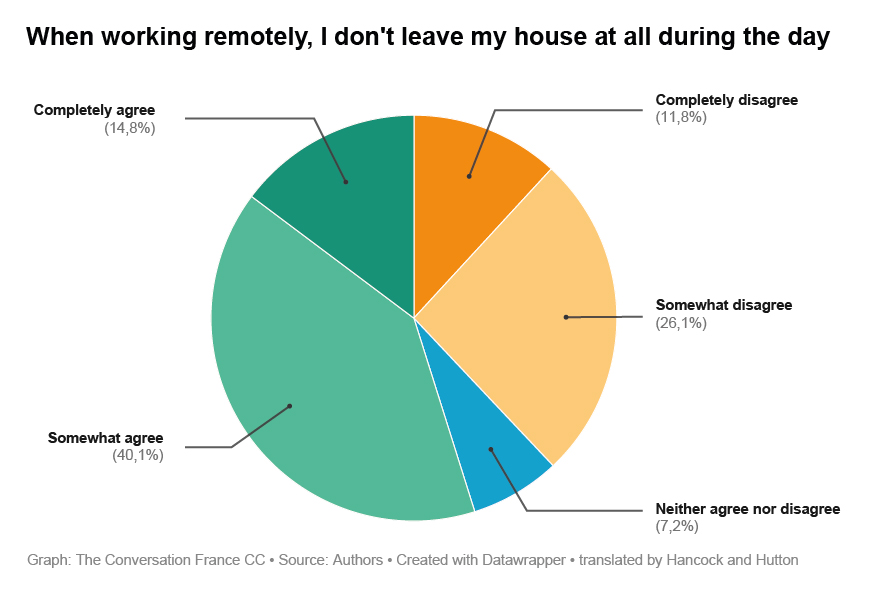
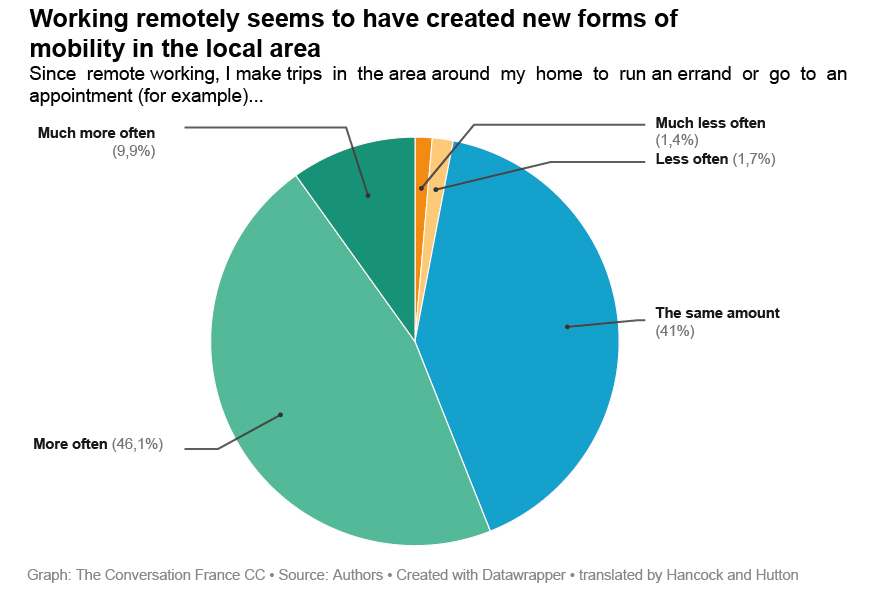
Fewer trips but not fewer cars
Our second conclusion is that this recentring will not lead to a major change in the number of car-owners. While only 1% of respondents feel that they would like to have a car, the fact remains that only 8% are considering selling theirs, since starting to work remotely. However, remote working seems to have decreased the average distances travelled for 55% of respondents.
As it happens, reducing commutes could lead to activities being transferred to other household members. That is what we observed: 18% of respondents state that the car is used by another household member on the days that they work remotely.
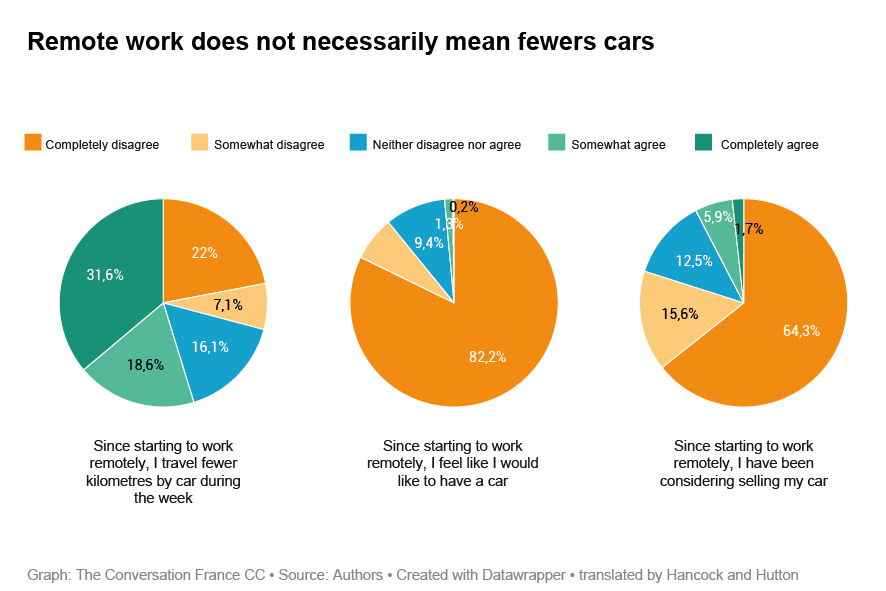
Remote working does not especially push people to move
Lastly, our study counters the hypothesis of a massive urban exodus related to remote working, in line with other recent studies. Only 6% of respondents moved due to the possibility of working remotely, 2% before the Covid-19 pandemic and 4% since. Only 26% of remote workers state they could live further away from their current place of work, and 27% that they could apply for a job further away.
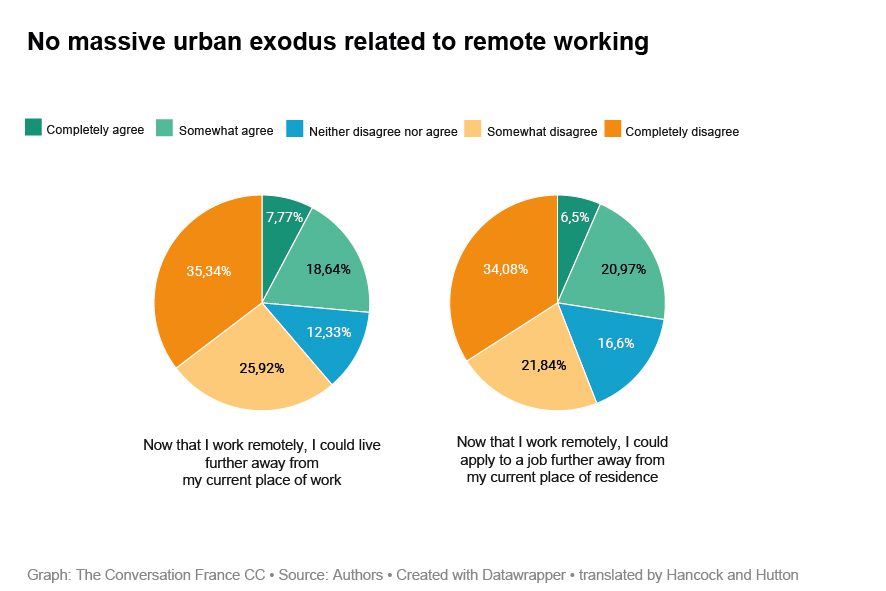
While remote workers tend to live further away from their workplace than non telecommuters, the causal link between remote work and home-work distance has not yet been established. At this point, it is not known if the option of working remotely encourages professionals to move further away from their workplace, or if remote working is more attractive for those who already live far away from their workplace.
While the choice of where to live remains a complex process, influenced by family and personal factors, remote work seems to play a secondary and indirect role in this process. It appears to respond more to individual needs than act as a driver of major change in people’s residential strategies. Nevertheless, remote working likely affects key criteria in terms of surface area and layout and location of the home. Some individuals may choose to have multiple residences or even become digital nomads.
These lifestyle transformations showcase the potential of remote work to reorganise the daily life of professionals and their families, which up until now has been underexploited. By freeing up time, this practice offers a significant opportunity for people to experience a greater degree of choice, appreciation, pleasure and comfort derived from changing to more desirable mobility practices.
Identity card of the article
| Original title: | Comment le télétravail impacte-t-il nos mobilités ? |
| Authors: | Eléonore Pigalle, Anne Aguiléra, Leslie Belton-Chevallier |
| Publisher: | The Conversation France |
| Collection: | The Conversation France |
| License: | This article is republished from The Conversation France under a Creative Commons license. Read the original article. An English version was created by Hancock & Hutton for Université Gustave Eiffel and was published by Reflexscience under the same license. |
| Date: | April 24, 2024 |
| Langages: | French and english |
| Keywords: | car, remote work, mobility, households, moving |
![[Translate to English:] Consultez le site web The Conversation France](https://reflexscience.univ-gustave-eiffel.fr/fileadmin/_processed_/7/c/csm_TC_Stacked-ENG-FR_d13cf8099d.png)
![[Translate to English:] Licence creative commons BY-SA 4.0 [Translate to English:] Licence creative commons BY-SA 4.0](https://reflexscience.univ-gustave-eiffel.fr/fileadmin/ReflexScience/Accueil/Logos/CCbySA.png)